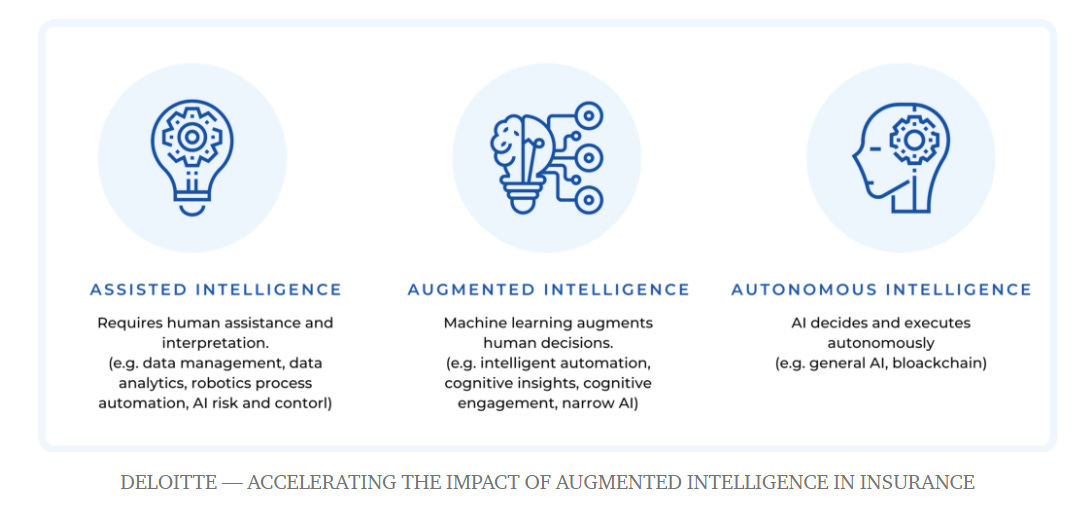Role of Insurance Agents in the AI Age
As insurers adopt and experiment with technology to increase client interactions, will AI systems work in tandem with humans or threaten their roles in the insurance industry.
As insurers increasingly recognize its potential, attitudes toward AI have changed dramatically over the past year. In Genpact's second AI 360 report, AI adoption is accelerating rapidly among insurers, with 87% of carriers investing more than $5m in AI-related technologies each year. This is more than both banking (86%) and consumer goods and retail companies (63%).
Plans for AI are becoming more extensive, and all our respondents expect to adopt AI within the next three years.
Insurers’ investments in AI-related technologies each year
With 2022 almost behind us, the world is looking ahead to new beginnings. According to Accenture’s Technology Vision for Insurance 2020 report, 81% of insurers acknowledge that technology has become an unavoidable part of the human experience. Yet, most agencies continue to hold onto the pen and paper business model. The role of a group health insurance broker is to evaluate coverage needs and negotiate the best terms and conditions. Imagine a world where technology immediately puts these answers at your fingertips to identify the risks clients face and match them to the best policy.
While the friendly neighborhood insurance agent continues to interact with clients via phone, in person, and over the Internet, carriers are staring at a complete redefinition of the brick-and-mortar insurance shop. With sophisticated and predictive technologies now available, a gut feeling or personal prediction is no longer sufficient for risk assessment.
AI systems, working with humans achieve better, faster, and reliable results. By 2030, it is estimated that up to 800 million individuals will face job displacement due to automation & AI across a multitude of industries. Advances in AI is projected to cause a seismic shift in most professions, with insurance agents at the risk of being severely affected. While this shift is years away and is dependent on the pace of technological innovation and social change, nevertheless it is an eventuality.
Impact of AI and automation on the insurance industry
Insurance organizations are only realizing a fraction of their AI potential, particularly for employee roles.
Accenture’s in-depth 2020 study shows that 68 percent of insurance companies are integrating AI in one or more business units, most are just getting started with new technologies.
Mckinsey’s Insurance 2030 report asserts that the role of insurance agents will change dramatically by 2030.
The number of agents will reduce and those remaining will rely heavily on technology to increase productivity.
Instead of selling, the agent of the future will add value through AI-enabled tools, smart personal assistants, and bots.
This will enable them to optimize and discover better potential deals for their clients, in turn helping agents support a much larger client base.
Customer interactions will be a mix of in-person, virtual, and digital, tailored to be more meaningful and precise to the needs of each individual client.
Agents with machines are the future of insurance
What we see is that by building the capabilities needed for AI and people to work together seamlessly, the demise of insurance agents and brokers is a premature prediction. AI does not threaten their jobs but in fact, augments their current capabilities. Assistance from data mining will make for better decision-making processes, and free them up to focus on new and existing customers.
Chatbots already aid in customer complaints and process simple transactions. They can be as simple or sophisticated as needed, from automatically setting appointments, answering FAQs, and/or providing ‘always available customer support. With interactions tracked they can be optimized for each individual customer in time. The customer will have less of a need to speak with a human representative and get a quicker response than from a live agent.
Robotics and AI, more than anything else, can automate claims processing and document verification. It means that agents with skills in data analytics and machine learning will be in high demand. Automation and robotics will simply take over menial tasks in the future, allowing human personnel to focus on more complex tasks, such as managing portfolios and retaining clients.
AI will improve human advisory abilities with the availability of more sophisticated data, tools, and algorithms, helping insurers provide better investment decisions for their customers.
With the use of machine learning, augmented intelligence can interpret data more clearly and quickly, enabling more accurate predictions to be made about the market, premiums, and products, leading to decisions based on data, not intuition or past experience.
Agents of Future
It seems unlikely that AI will replace humans in the insurance industry, especially in roles that require specialized expert judgment, and experience in claims management and underwriting. Even those dealing with customer inquiries and renewals will find that several activities are nuanced and multi-layered, requiring their judgment and expertise in various situations.
The agent of the future will:
Gain insight into customer intent to identify opportunities and recommend, the right products, coverage, limits, and deductibles at the right time.
Diagnose and resolve trouble areas, develop new products, and enter new markets based on data-backed insights into customer trends.
Monitor patterns to spot threats early and take prompt action.
As customer demands change, insurers will shift from transactional, low-touch customer interactions to high-value and high-touch customer interactions. Individual needs will no longer be defined by product features and standardized pricing, pushing insurers to cater to customized needs, and preferences with solution-based offerings.
Source: https://roadzen.medium.com/is-ai-going-to-replace-insurance-agents-304e44ea5faa
What are your views on this topic? Share your feedback in the comment section below!




